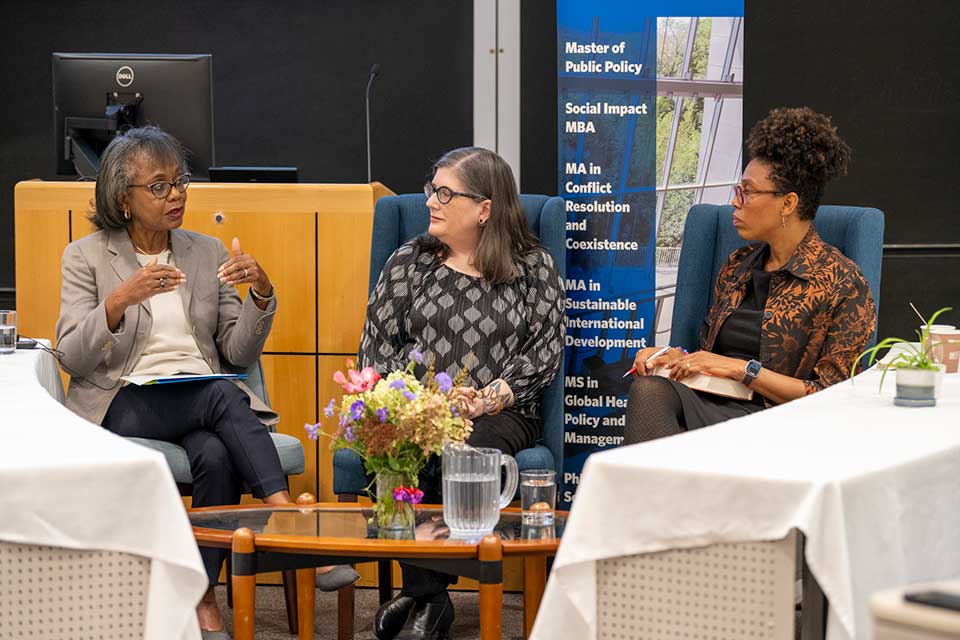Imperiled Bodies John E. Sawyer Mellon Seminar

Pictured L to R: Anita Hill, Sarah Deer, and Crystal Feimster during Session 2: Slavery, Citizenship, and the Afterlife of Gender-Based Violence
Photo Credit: Quentin W. Cox
Slavery, Colonialism, Citizenship and The Logics of Gender-Based Violence
2023-2024 Academic Year
This interdisciplinary John E. Sawyer Seminar, supported by the Mellon Foundation, explored gender-based violence and the abiding fiction that it is a natural and inevitable facet of the family, state, and nation. It investigated the logics and mechanisms by which violence is woven into the ordinary and the institutional structures of heteropatriarchy, colonialism, imperialism, racism, and capitalism. In this sense, gender-based violence—whether physical or symbolic—is a constitutive act that defines belonging and exclusion. Intimately embedded in quotidian life, it often takes a singular event to disrupt the “normalcy” of gender-based violence and illuminate the routine harms that pervade our lives. This seminar examined these ruptures in the logics of violence that “name the pain” (to quote bell hooks) and transform the law, the social imaginary, and material life. We must attend equally to the lived experience—that is, narratives not only about embodied violence, especially against specific gendered, racialized, and disabled subjects, but also acts of resistance through literature, art, and film that defy the forces that create imperiled bodies. Thus, this seminar addressed the affective dimension alongside the political and historical to elucidate the insidious nature of gender-based violence and to envision a future without it.
The seminar brought together scholars of literature, history, art, and law to explore gender-based violence in the United States, Mexico and Central America, Jamaica and Trinidad, India, South Korea, and Israel/Palestine from the nineteenth century onward. The conjoined histories and afterlives of colonialism, slavery, war, colonial settlements, and more provide a theoretical vertebra for their varied, yet connected global trajectories. Drawing on the rich educational resources of metropolitan Boston, we also partnered with local and national organizations. The nine panel sessions spanning the 2023-2024 academic year and an associated exhibition fostered rich, intellectual collaborations, built on and helped germinate new classes and programming in the ensuing years. The seminar coincided with the 75th anniversary of Brandeis University’s founding and the 65th anniversary of the founding of the Heller School for Social Policy and Management. It amplified the social justice mission and history of the university with its long engagement with gender-based violence—from Pauli Murray (1968-73) to Anita Hill (1998-present).
Sponsors
Events in the year-long Mellon-Sawyer seminar are sponsored by a prestigious John E. Sawyer Seminar grant from the Mellon Foundation that is led by PI Anita Hill (Heller School for Social Policy and Management), co-PI Harleen Singh (Senior Associate Provost for Faculty & Global Affairs, Director of the Women’s Studies Research Center, and Associate Professor of Literature and Women's, Gender and Sexuality Studies), and ChaeRan Freeze (Frances and Max Elkon Chair in Modern Jewish History).
Brandeis University sponsors and resources include the Heller School for Social Policy and Management, the Department of Women's, Gender, and Sexuality Studies, the Mandel Center for the Humanities, the Women’s Studies Research Center, the Hadassah Brandeis Institute, the Feminist Sexual Ethics Project, the Rose Art Museum, the Kniznick Art Gallery, the Gender and Sexuality Center, and the Prevention, Advocacy, and Resource Center.
This seminar is among the signature events of the Heller 65th Anniversary year, Celebrating Knowledge Advancing Social Justice #Hellerat65.



